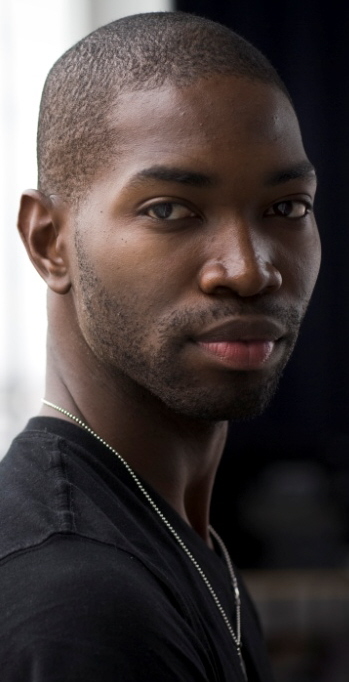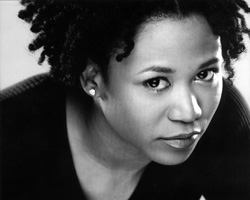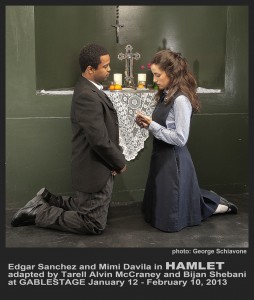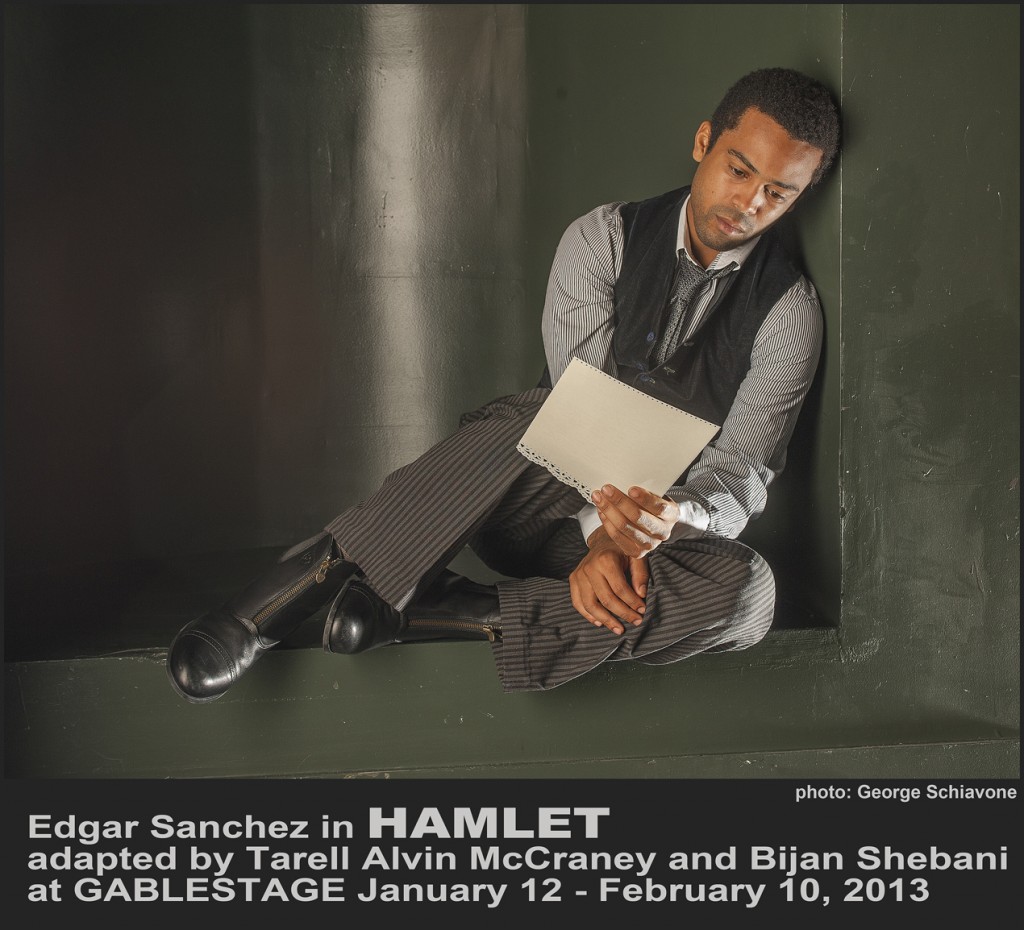By Bill Hirschman
“I’m doing all right as long as I don’t pass out.”
It’s November and Tarell Alvin McCraney has sandwiched in a trip back to his hometown to prep his January 12 production of Hamlet at GableStage and talk up his dream of a winter theater festival in Miami – just a local stop in a globetrotting schedule that would cause some people to implode.
He reels off his datebook: He was in London in September to open his newest work, Choir Boy. The same month, back in Miami to audition actors for Hamlet. Then to Chicago workshopping a different play at Steppenwolf Theatre, then back to Miami to develop the winter festival project. Rehearsals for Hamlet were slated for Dec. 11.
With equanimity, enthusiasm and reined-in anxiety, he keeps listing.
 “As soon as Hamlet opens in January, I have to go to New York for auditions for Manhattan Theater Club’s production of Choir Boy, which rehearses in June and opens in July. Before that, my play Head of Passes opens at Steppenwolf in April, so we start rehearsals for that in March.… Then I have a two-week workshop of Antony and Cleopatra around April-ish” for the Royal Shakespeare Company. “Then I’ve got to get into rehearsal for Choir Boy, end of May, early June, and start rehearsals for Antony and Cleopatra in August.”
“As soon as Hamlet opens in January, I have to go to New York for auditions for Manhattan Theater Club’s production of Choir Boy, which rehearses in June and opens in July. Before that, my play Head of Passes opens at Steppenwolf in April, so we start rehearsals for that in March.… Then I have a two-week workshop of Antony and Cleopatra around April-ish” for the Royal Shakespeare Company. “Then I’ve got to get into rehearsal for Choir Boy, end of May, early June, and start rehearsals for Antony and Cleopatra in August.”
Finally, the Antony and Cleopatra, which he is adapting and directing, goes into full production in England in the fall, then moves to GableStage in January and then on to the Public Theater in New York City.
That eddying ebb and flow of schedules and endless string of hotel rooms represent commitments stretching well into 2014.
At age 32, with accolades from two continents, a residency at New Dramatists, membership in Steppenwolf’s ensemble, and simultaneous demands from uncounted theater companies, McCraney pretty much lives on the road, relying on his smartphone and an electronic tablet that allows him to take his “home” library with him around the world.
But it’s the two Shakespeare projects with ties to Miami that are singularly important to him. His stripped-down, heavily re-imagined adaptations represent the first fruits of a dream he has nurtured for years: creating a Winter Shakespeare Festival in Miami with GableStage that speaks to a younger audience and helps establish Miami as an internationally recognized theater center.
Cynics may scoff at the likelihood, but McCraney speaks with the infectious zeal of an unfettered dreamer: “Here is an opportunity to get on something that is Miami-made that will then go out around the world and be a calling card for Miami and do what the Broadway (touring show) series do for New York and Broadway…. We’re a city at this stage of the game where we can begin to dream that way and we have the talent pool to boast about.”
It’s the flesh and blood reality to the cliché of giving back to the arts community that gave direction to his life. The story has been oft-repeated of a Dickensian childhood in Homestead, Liberty City, Overtown and Coconut Grove. His father left home early on. His mother fought a lengthy and eventually fatal battle with crack addiction. The family struggled with poverty while McCraney served as a surrogate parent to his siblings. Hurricane Andrew wiped out everything they owned. When his mother checked into rehab, he moved back in with his devout father who rejected the boy’s incipient homosexuality. He was bullied for being “sensitive.” He watched neighbors sink into lives of drugs and crime.
His lifeline was a fascination first with dance and then theater in magnet schools and a teen program called Village South Improv run by Teo Castellanos.
So now in January, he is back home, reportedly fighting off a cold and still traveling many places on his bicycle, deep into rehearsals for the Hamlet that he adapted for the RSC with Bijan Shebani in 2010 but has since overhauled for its bow at GableStage to fit his hometown’s cultural mélange.
Not Your Father’s Hamlet
While GableStage’s adult subscribers are meant to appreciate it, this 90-minute version of the famously 4 ½ -hour masterpiece is designed to entrance students in their first exposure to Shakespeare, not bore and alienate them. GableStage will present free performances for thousands of Miami-Dade County Public School students in Liberty City and Cutler Bay.
The adaptation is still rooted in Shakespeare’s verse; McCraney is too much a devoted student of theater to gut it. But, he said, “the language, we pared it down.… It’s just now and then (Shakespeare) goes off into tangents and you have to trim that back. We did simple things like eliminating lines and adding music and trying to make sure that the storytelling was still the same and make sure the larger passages from Shakespeare were really there” such as the ‘To be or not to be’ soliloquy.
The recast tale plugs into Miami’s melting pot, starting with the casting. Hamlet is played by Edgar Miguel Sanchez, a Dominican raised here who McCraney knew from Miami and DePaul University in Chicago. Sanchez, who has performed Shakespeare around the country, sent in a video of his work to snag McCraney.
McCraney is even more jazzed about working again with his Queen Gertrude, Alana Arenas. He has been developing his love for theater alongside her since they were children at the African American Heritage Cultural Arts Center in Miami and then as classmates at the New World School of the Arts.
 Arenas said this week that she was not surprised at his success. Even in school, he exuded the work ethic and an aura that persists to this day: “I knew he was so different, had so much depth and an expansiveness beyond what was normal for our age.”
Arenas said this week that she was not surprised at his success. Even in school, he exuded the work ethic and an aura that persists to this day: “I knew he was so different, had so much depth and an expansiveness beyond what was normal for our age.”
Arenas, who was accepted as ensemble member at the Steppenwolf Theatre Company three years before McCraney, performed in his Brother/Sister plays at the Chicago institution in 2010. Working directly with him then was a revelation. “I kind of always knew there was something extraordinary there. I just did not know he was that beautiful.”
When he offered her a chance to perform at home – the first time in her life as an adult – she jumped at it.
The final cast includes Mimi Davila, Ryan George, Dylan Kammerer, Arielle Hoffman, veteran actors Peter Haig and James Samuel Randolph, the New World teacher who has portrayed Othello and Lear for New Theatre.
McCraney has a clear sense of how the show should look and sound. He carefully weaves in hand-picked music. His flair for stylized theatricality characterized his own staging of The Brothers Size at GableStage in September 2011. He created a bare bones environment but invested it with the kind of theatrical movement he learned as a nascent dancer with Castellanos.
In the 2010 production of Hamlet at the RSC, he substituted red silk handkerchiefs for blood, black umbrellas for swords. But his guiding principle remains “serving the play. I try not to get in the way of Shakespeare and the actors. His clarity and his language are what we strive to achieve,” he said.
Language and cadence are crucial. His own original works such as In the Red and Brown Water feature a colloquial combination of poetic imagery, street vernacular and gutter profanity. It’s obviously no less crucial when dealing with Shakespeare, even when editing archaic 17th Century verbiage.
 Parts of rehearsals focus on the rhythm of the words, Arenas said. “He comes from working within the musicality of something. There’s the actual rhythm of playing (the scene) and the actual rhythm of living inside the worlds we’re visiting.” He has actors in a group individually count off numbers, trying to feel a specific rhythm. “If you hesitate, if you hold back for whatever reason, someone else is waiting for you” so they can say their number.
Parts of rehearsals focus on the rhythm of the words, Arenas said. “He comes from working within the musicality of something. There’s the actual rhythm of playing (the scene) and the actual rhythm of living inside the worlds we’re visiting.” He has actors in a group individually count off numbers, trying to feel a specific rhythm. “If you hesitate, if you hold back for whatever reason, someone else is waiting for you” so they can say their number.
He also mashes up styles and cultures in a way that mirrors Miami. McCraney is open to the idea that “there are so many different worlds coming together in telling the story,” she said. Rosencrantz and Guildenstern enter as if they have come from a commedia delle’arte play, but Gertrude and Polonius enter in confab like a president being briefed on a political issue by a secretary of state.
Only An Appetizer
If the style sounds challenging for South Florida’s mainstream audiences, GableStage Producing Artistic Director Joseph Adler’s championing of McCraney is also a risk. After working years to get McCraney to come home for the first local professional production of his work with The Brothers Size, attendance was not as strong as he had hoped.
Perhaps just as difficult, Adler is leaving McCraney to execute his vision unimpeded. Adler, a legendarily strong-willed director/producer with a clear vision, appreciates that he must respect McCraney’s autonomy. “It’s especially hard when you put someone else in charge,” Adler said last week. “You have to believe in them. Directing is about making 100 decisions every day. I don’t want people meddling when I do it. So I can’t do it.”
In fact, Adler is doubling down his bet – and then some – by joining forces with McCraney for their evolving vision of the winter festival project. The ultimate form may be an annual offering of two or more plays, perhaps performed by an ad hoc repertory troupe, with some entries written and directed by McCraney – a sort of theatrical Art Basel to draw worldwide attention. McCraney points to the international success of the Oregon Shakespeare Festival, which is located 200 miles from any major city. Each year in Miami, a traditional mounting of a classic would be complemented by a more stylistically adventurous piece that would bring in young audiences.
“I can imagine doing The Tempest outside at a bayfront or a coastal amphitheatre, and all of a sudden, there’s a (real) storm,” McCraney said.
McCraney admits that for all his accumulated knowledge of the artistic side of theater, he needed help from old hands like Adler and Miami-Dade Cultural Affairs Director Michael Spring to navigate the nuts and bolts of creating the infrastructure for such an undertaking.
“When you try a project like this on your own from the beginning, you learn some things. Like, for example, I tried to apply to the Knight Foundation (Arts Challenge) early on and I didn’t really know how to do it. I just had a really crazy dream…. So when I came around the second time, Michael Spring and Joe were in a place where they could totally sign on board with the proposition of bringing on the RSC and the Public to help with this project and attract the Knight Foundation.”
Creating the festival is a long haul undertaking. One obstacle is the Bard’s works rarely make a ripple in the Miami area arts scene. McCraney said, “It’s going to be hard to get people in Miami to sit and watch a very depressing play for four hours when the sun is shining until six, seven o’clock. People would rather sit outside on the strip. So we’ve got to find ways of helping them invest deeper in the theater.”
The secret is to develop it one step at a time, said Adler.
McCraney understands: “Hamlet is a sort of appetizer. We’re getting a main meal ready for this thing, and it’s going to take more support financially and more attention to make this project really work. One of the great ideas that came from Joe and Michael Spring and the Knight Foundation is that they want to make really sure that every year leading up to it, we’re doing something every year to whet the appetite of the community, to lay the groundwork of the thing. So for this Hamlet, it’s about going, ‘Look, this is how it will look.’ It’s a smaller intimate version of what we’re planning on doing, and of course, without breaking the bank.”
The Next Level
The second course in the menu is to bring Antony and Cleopatra to GableStage in the winter of 2014, a jointly financed tour that will originate with the Royal Shakespeare Company and end at New York City’s Public Theater. The plan is to perform it at the 1,500-seat Olympia Theatre at the Gusman Center for the Performing Arts instead of GableStage’s 155-seat theater at the Biltmore Hotel because it will only have a two-week run in Florida. That will enable hundreds of school children to see the production during the day; at night, sections will be cordoned off to leave 700 seats for the smaller adult audiences.
Antony and Cleopatra is an unusual choice to stir up popular support. Not one of the Bard’s best known works, it often involves a large cast, lavish production values and an epic scope. In fact, it wasn’t McCraney’s choice. The adaptation was assigned by the RSC as part of his residency there in 2009 to 2011. But as he studied the piece, he was intrigued by Shakespeare’s correlation of Rome and Egypt to the cross-pollination of France and England.
“It’s about colonizing Egypt and trying to tame it and put it under Rome’s (domination) … and this love affair that blossoms out of it. That to me was much more powerful, palpable than anything…. I said, ‘These 9,000 words all over the place, let’s get rid of that,’ and I slimmed it down deeply. But I still felt it was missing something.”
Something about the remaining sense of ceremony struck a chord. He became captivated by the culture clash of the calcified “old world” of Rome and the freer, earthier “new world” of the land being occupied.
“And I thought, well, where does that exist? Where have I seen that smash up of the old world and the new world? And I thought it must have been that way in Haiti or in the Caribbean in general” in the late 1700s against the backdrop of Saint-Domingue, on the eve of the Haitian Revolution against the French.
RSC head Michael Boyd liked the piece but said it could not be done in the next season, because, among other reasons, the RSC did not have instant access to enough actors of color, McCraney said. “But he said I really don’t want this to go away.”
You could almost see McCraney’s smile over the telephone as he retold the story: “Of course, in the back of my head, I always thought, ‘Well, I’m going to do this in Miami anyway. Where else could you do a Haitian Antony and Cleopatra except in one of largest populations of Haitians that you will find outside of Haiti? So I said (to Boyd), ‘Why don’t we do it in Miami?’ and pretending as if it was a new idea, pretending like I wasn’t plotting this all along. But you have to be careful with Michael because once he says ‘yes,’ he’s going to make it happen.”
Thus was born the idea of the three-way co-production.
But the scope and price tag is daunting. The Antony and Cleopatra budget is $2 million with GableStage committing to front about $700,000. The Knight Foundation’s Arts Challenge has pledged $120,000 in matching funds. By comparison, GableStage’s entire annual operating budget is under $1 million and the lavish productions at Maltz Jupiter Theatre can cost $400,000. Adler is optimistic that the support will come through, especially from the private sector for an internationally prestigious project: “I can’t imagine that it won’t take place.”
Hampering the project a bit has been McCraney’s criticism of the status quo of the arts in Miami, he freely admits with an embarrassed laugh.
“I get in trouble all the time. I’ve been reprimanded about nine times for offending people. And it’s not that I’m trying to offend anyone; what I’m trying to do is sort of point out some things from an artistic point of view.… I go around the country and I see these cities are willing to back artistic endeavors. Miami can and wants to do that; it just needs artists who can bite the bullet a while and stay. It’s hard, I know.”
That also requires public and corporate support. “Miami isn’t even recognizing its own talent here, so a part of the job is to say to Miami, ‘Look, don’t sleep on your own talent pool, don’t sleep on your ability to create impressive and awesome cultural experiences that people around the world will want to get involved in.’ ”
The Hamlet opening this month is just the first step toward a vision, he said, “that speaks to tourism, that speaks to our cultural past, our cultural cachet, but it also speaks to an infrastructure for our children who want to grow up in a city that has more than a baseball stadium.”
Hamlet runs through Jan. 12-Feb. 10 at GableStage, 1200 Anastasia Ave., Coral Gables, inside the Biltmore Hotel. Performances 8 p.m. Thursday-Saturday, and 2 p.m. and 7 p.m. Sunday. Tickets $37.50 – $50. For tickets and more information, call 305-445-1119 or visit GableStage.org. A preview performance is set for 8 p.m. January 11 to benefit the theater division of New World School of the Arts.








 A PaperStreet Web Design
A PaperStreet Web Design

Pingback: McCraney’s Streamlined Hamlet Embraces The Music of the Bard | Florida Theater On Stage